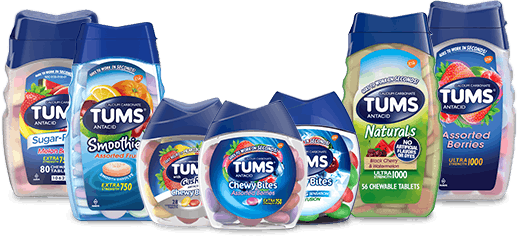Remedies for Occasional Heartburn: Do They Really Work?
Baking soda, chewing gum, ginger root—if you occasionally experience heartburn, chances are you’ve tried it all. As tempting as it is to dive headfirst into the latest and most promising home remedy as soon as that burning feeling comes on, not all heartburn remedies are created equal. Below, we investigate some popular remedies for occasional heartburn to find out if they really work.
Ginger for Heartburn
You might already have this aromatic root in your pantry if you’re planning on making a curry or gingersnap cookies. The ginger you eat is the root of the Zingiber officinale.1 Ginger root is widely touted as a remedy for occasional digestive upset, including stomachaches, diarrhea, and nausea, and is available fresh or dried. Ginger dietary supplements can also be found in tablet, capsule, liquid extract, and tea form.
Can ginger provide heartburn relief? While it cannot immediately stop occasional heartburn like antacids, ginger has distinct benefits for gastrointestinal motility, which is the speed that food exits the stomach and continues through the digestive process.1 Consuming ginger helps you to digest your food more quickly so that what you’ve eaten doesn’t linger in your stomach.1 While this herb doesn’t have a direct effect on your stomach acid or on your lower esophageal sphincter, its role in digestion can make ginger a big help for those with occasional acid reflux.6 By aiding in digestion, you’ll feel less full and there will be less in your stomach to potentially cause heartburn. What’s more, ginger can help to counteract bloating, gas and nausea.1 So if you typically experience heartburn after eating, try a cup of warm ginger tea to kickstart your digestion and counteract the occasional symptoms of heartburn.1
Apple Cider Vinegar
A mainstay of every health food store, apple cider vinegar is extolled for a number of health benefits from immune support to weight management. Apple cider vinegar is made by crushing apples, squeezing out the juice, and then fermenting it into a peppery vinegar that is delicious when used in salad dressings, marinades or pickled vegetables. Drinking a small amount of raw apple cider vinegar is also a popular remedy for heartburn.
But does apple cider vinegar work to counteract occasional heartburn? There is no conclusive evidence. The idea behind taking apple cider vinegar for occasional heartburn is that stomach acidity controls the lower esophageal sphincter: if the stomach has not produced enough acid, muscles around the sphincter will relax and let more gastric acid pass through. Therefore, consuming vinegar is an attempt to support the stomach’s acidity levels and prevent this from happening. However, this process relies on more factors than stomach acidity2 and there is no evidence in published medical studies that apple cider vinegar is an effective remedy for heartburn.2
Torso Elevation
Experiencing heartburn right as you’re about to fall asleep is definitely up there on our list of “least favorite times to get heartburn.” One home remedy that people have tried for occasional nighttime heartburn relief is elevating the head of their bed, or using a torso wedge so that the body is elevated from the waist up.
Is this home improvement project for your bedroom worth it? Yes! Torso elevation is an effective remedy for heartburn. By raising your torso so that it’s angled downwards, pressure on your lower esophageal sphincter is eased, which can help relieve the heartburn you experience while laying down at night.3 If you share a bed with someone, or don’t want to go through the trouble of elevating your entire mattress, wedge-shaped cushions work just as well to elevate and tilt your torso.
However, don’t try to achieve the same effect by propping your head up with pillows and cushions, as this can actually make your acid reflux worse.3 Leave it to the medical professionals and consult your doctor if you’re unsure how to effectively use a bed wedge.
Chewing Gum
Not just for helping freshen your breath, chewing gum is also lauded as a popular fix for heartburn. Popping a piece of gum after a meal sounds too good to be true—is chewing gum really an effective natural remedy for heartburn? Yes! With a catch. Chewing sugar-free gum after eating can help promote salivation, which in turn neutralizes acid and soothes the esophagus, helping wash stomach acid back down where it belongs.4
On the subject of peppermint oil, it’s also important to note that taking an enteric-coated peppermint oil capsule at the same time as an antacid can cause the enteric coating to break down too fast, increasing the likelihood of occasional heartburn.5
Though remedies like ginger are effective for some issues, they are not always a surefire way to get holistic relief. When in doubt, reach for a tried-and-true remedy for occasional heartburn like TUMS.
SOURCES
- Ginger Benefits. Johns Hopkins Medicine. https://www.hopkinsmedicine.org/health/wellness-and-prevention/ginger-benefits. Accessed 10/30/23.
- Apple cider vinegar… for heartburn? Harvard Health Publishing. https://www.health.harvard.edu/blog/apple-cider-vinegar-for-heartburn-2018032813530. Accessed 10/31/23.
- 11 stomach-soothing steps for heartburn. Harvard Health Publishing. https://www.health.harvard.edu/staying-healthy/11-stomach-soothing-steps-for-heartburn. Accessed 10/31/23.
- 8 ways to quell the fire of heartburn. Harvard Health Publishing. https://www.health.harvard.edu/staying-healthy/8-ways-to-quell-the-fire-of-heartburn. Accessed 10/31/23.
- Peppermint Oil. National Center for Complementary and Integrative Health. https://www.nccih.nih.gov/health/peppermint-oil. Accessed 10/31/23.
- Effect of ginger on lower esophageal sphincter pressure. National Library of Medicine. https://pubmed.ncbi.nlm.nih.gov/20420113/. Accessed 10/31/23.


